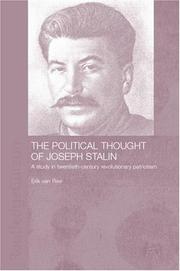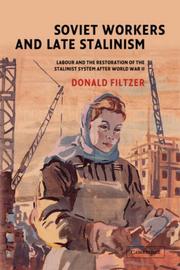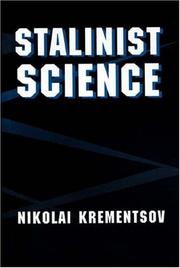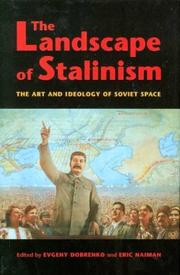| Listing 1 - 10 of 34 | << page >> |
Sort by
|

ISBN: 0700717498 1135786054 1280106387 020322163X 9780203221631 9781135786045 1135786046 9780700717491 9781135786052 9781135786007 9780415406260 Year: 2003 Publisher: London New York RoutledgeCurzon
Abstract | Keywords | Export | Availability | Bookmark
 Loading...
Loading...Choose an application
- Reference Manager
- EndNote
- RefWorks (Direct export to RefWorks)
Based upon documentation that has recently become available, Erik van Ree's study presents a comprehensive analysis of the political thought of Joseph Stalin. The author traces the dictator's influences back as far as the Jacobins.
Politics and Government. --- Russia & Former Soviet Republics --- Regions & Countries - Europe --- History & Archaeology --- Stalin, I. --- Soviet Union --- Politics and government --- Political science --- Philosophy. --- Political philosophy --- Stalin, Joseph, --- Djougatchvili, Iossif Vissarionovitch, --- Джугашвили, Иосиф Виссарионович, --- Dzhugashvili, Iosif Vissarionovich, --- Koba, --- Shih-tʻai-lin, --- Sidalin, --- Ssu-ta-lin, --- Stalin, Giuseppe, --- Сталин, И. В. --- Stalin, I. V. --- Сталин, Иосиф, --- Stalin, Iosif, --- Сталин, К., --- Stalin, K., --- Staline, --- Staline, Joseph, --- Staljin, J. V., --- Sutārin, --- Soselo, --- Stalini, Ioseb Besarionis że, --- Sṭalin, Y. Ṿ., --- Sṭalin, Y., --- Stalin, Josef, --- Stalin, Josef Vissarionovich, --- סטאלין, יאסיף, --- סטאלין, י. --- סטאלין, י. וו --- סטאלין, י. װ. --- סטאלין, י., --- סטלין, יוסיף ויסאריונוביץ׳, --- סטלין, יוסף --- 斯大林, --- Stalin, Jossif Vissarionovitš, --- Sztálin, Joszif, --- Istālīn, Yūsīf Vīsāryūnūvīch, --- استالين، يوسيف ويساريونووتج, --- Σταλιν, Ιωσηφ, --- Stalin, Ιōsēph, --- Jughashvili, Ioseb, --- Jughashvili, Ioseb Vissarionovich, --- Jughashvili, Koba,

ISBN: 0521039207 0521815037 0511120699 0511042558 0511158173 0511329989 0511497164 1280163518 0511045727 1107125952 9780511045721 9780511120695 9780521815031 9780511042553 9781107125957 9781280163517 9780511158179 9780511329982 9780511497162 9780521039208 0511094159 Year: 2002 Publisher: Cambridge : Cambridge University Press,
Abstract | Keywords | Export | Availability | Bookmark
 Loading...
Loading...Choose an application
- Reference Manager
- EndNote
- RefWorks (Direct export to RefWorks)
Soviet Workers and Late Stalinism is a study of labour and labour policy during the critical period of the Soviet Union's postwar recovery and the last years of Stalin. It is also a detailed social history of the Soviet Union in these years, for non-Russian readers. Using previously inaccessible archival sources, Donald Filtzer describes the tragic hardships faced by workers and their families right after the war; conditions in housing and health care; the special problems of young workers; working conditions within industry; and the tremendous strains which regime policy placed not just on the mass of the population, but on the cohesion and commitment of key institutions within the Stalinist political system, most notably the trade unions and the procuracy. Donald Filtzer's subtle and compelling book will interest all historians of the Soviet Union and of socialism.
Labor. --- Labor policy. --- Soviet Union--Politics and government--1945-1991. --- Labor --- Labor policy --- Labor & Workers' Economics --- Business & Economics --- History --- Arts and Humanities --- History. --- Soviet Union --- Economic conditions --- Politics and government --- State and labor --- Labor and laboring classes --- Government policy --- Economic policy --- Manpower --- Work --- Working class --- Stalin, Joseph, --- Djougatchvili, Iossif Vissarionovitch, --- Джугашвили, Иосиф Виссарионович, --- Dzhugashvili, Iosif Vissarionovich, --- Koba, --- Shih-tʻai-lin, --- Sidalin, --- Ssu-ta-lin, --- Stalin, Giuseppe, --- Сталин, И. В. --- Stalin, I. V. --- Сталин, Иосиф, --- Stalin, Iosif, --- Сталин, К., --- Stalin, K., --- Staline, --- Staline, Joseph, --- Staljin, J. V., --- Sutārin, --- Soselo, --- Stalini, Ioseb Besarionis że, --- Sṭalin, Y. Ṿ., --- Sṭalin, Y., --- Stalin, Josef, --- Stalin, Josef Vissarionovich, --- סטאלין, יאסיף, --- סטאלין, י. --- סטאלין, י. וו --- סטאלין, י. װ. --- סטאלין, י., --- סטלין, יוסיף ויסאריונוביץ׳, --- סטלין, יוסף --- 斯大林, --- Stalin, Jossif Vissarionovitš, --- Sztálin, Joszif, --- Istālīn, Yūsīf Vīsāryūnūvīch, --- استالين، يوسيف ويساريونووتج, --- Σταλιν, Ιωσηφ, --- Stalin, Ιōsēph, --- Jughashvili, Ioseb, --- Jughashvili, Ioseb Vissarionovich, --- Jughashvili, Koba,
Book
ISBN: 176046063X 1760460621 9781760460631 9781760460624 Year: 2016 Publisher: ANU Press
Abstract | Keywords | Export | Availability | Bookmark
 Loading...
Loading...Choose an application
- Reference Manager
- EndNote
- RefWorks (Direct export to RefWorks)
From 1929 until 1953, Iosif Stalin’s image became a central symbol in Soviet propaganda. Touched up images of an omniscient Stalin appeared everywhere: emblazoned across buildings and lining the streets; carried in parades and woven into carpets; and saturating the media of socialist realist painting, statuary, monumental architecture, friezes, banners, and posters. From the beginning of the Soviet regime, posters were seen as a vitally important medium for communicating with the population of the vast territories of the USSR. Stalin’s image became a symbol of Bolshevik values and the personification of a revolutionary new type of society. The persona created for Stalin in propaganda posters reflects how the state saw itself or, at the very least, how it wished to appear in the eyes of the people. The ‘Stalin’ who was celebrated in posters bore but scant resemblance to the man Iosif Vissarionovich Dzhugashvili, whose humble origins, criminal past, penchant for violent solutions and unprepossessing appearance made him an unlikely recipient of uncritical charismatic adulation. The Bolsheviks needed a wise, nurturing and authoritative figure to embody their revolutionary vision and to legitimate their hold on power. This leader would come to embody the sacred and archetypal qualities of the wise Teacher, the Father of the nation, the great Warrior and military strategist, and the Saviour of first the Russian land, and then the whole world. This book is the first dedicated study on the marketing of Stalin in Soviet propaganda posters. Drawing on the archives of libraries and museums throughout Russia, hundreds of previously unpublished posters are examined, with more than 130 reproduced in full colour. The personality cult of Stalin in Soviet posters, 1929–1953 is a unique and valuable contribution to the discourse in Stalinist studies across a number of disciplines.
Political posters, Russian. --- Stalin, Joseph, --- Symbolism. --- Russian political posters --- Djougatchvili, Iossif Vissarionovitch, --- Джугашвили, Иосиф Виссарионович, --- Dzhugashvili, Iosif Vissarionovich, --- Koba, --- Shih-tʻai-lin, --- Sidalin, --- Ssu-ta-lin, --- Stalin, Giuseppe, --- Сталин, И. В. --- Stalin, I. V. --- Сталин, Иосиф, --- Stalin, Iosif, --- Сталин, К., --- Stalin, K., --- Staline, --- Staline, Joseph, --- Staljin, J. V., --- Sutārin, --- Soselo, --- Stalini, Ioseb Besarionis że, --- Sṭalin, Y. Ṿ., --- Sṭalin, Y., --- Stalin, Josef, --- Stalin, Josef Vissarionovich, --- סטאלין, יאסיף, --- סטאלין, י. --- סטאלין, י. וו --- סטאלין, י. װ. --- סטאלין, י., --- סטלין, יוסיף ויסאריונוביץ׳, --- סטלין, יוסף --- 斯大林, --- Stalin, Jossif Vissarionovitš, --- Sztálin, Joszif, --- Istālīn, Yūsīf Vīsāryūnūvīch, --- استالين، يوسيف ويساريونووتج, --- Σταλιν, Ιωσηφ, --- Stalin, Ιōsēph, --- Jughashvili, Ioseb, --- Jughashvili, Ioseb Vissarionovich, --- Jughashvili, Koba, --- stalin --- soviet russia --- marketing --- poster art --- propoganda --- Cult of personality --- Joseph Stalin --- Moscow --- Propaganda --- Vladimir Lenin

ISBN: 069102877X 9786612753152 1400822149 1282753150 1400812437 9781400822140 9781400812431 9780691028774 9781282753150 6612753153 Year: 1997 Publisher: Princeton, N.J. Princeton University Press
Abstract | Keywords | Export | Availability | Bookmark
 Loading...
Loading...Choose an application
- Reference Manager
- EndNote
- RefWorks (Direct export to RefWorks)
Some scholars have viewed the Soviet state and science as two monolithic entities--with bureaucrats as oppressors, and scientists as defenders of intellectual autonomy. Based on previously unknown documents from the archives of state and Communist Party agencies and of numerous scientific institutions, Stalinist Science shows that this picture is oversimplified. Even the reinstated Science Department within the Central Committee was staffed by a leading geneticist and others sympathetic to conventional science. In fact, a symbiosis of state bureaucrats and scientists established a much more terrifying system of control over the scientific community than any critic of Soviet totalitarianism had feared. Some scientists, on the other hand, developed more elaborate devices to avoid and exploit this control system than any advocate of academic freedom could have reasonably hoped. Nikolai Krementsov argues that the model of Stalinist science, already taking hold during the thirties, was reversed by the need for inter-Allied cooperation during World War II. Science, as a tool for winning the war and as a diplomatic and propaganda instrument, began to enjoy higher status, better funding, and relative autonomy. Even the reinstated Science Department within the Central Committee was staffed by a leading geneticist and others sympathetic to conventional science. However, the onset of the Cold War led to a campaign for eliminating such servility to the West. Then the Western links that had benefited genetics and other sciences during the war and through 1946 became a liability, and were used by Lysenko and others to turn back to the repressive past and to delegitimate whole research directions.
Communism --- Science --- History --- History. --- Stalin, Joseph, --- Soviet Union --- Politics and government --- Bolshevism --- Communist movements --- Leninism --- Maoism --- Marxism --- Trotskyism --- Natural science --- Science of science --- Sciences --- Djougatchvili, Iossif Vissarionovitch, --- Джугашвили, Иосиф Виссарионович, --- Dzhugashvili, Iosif Vissarionovich, --- Koba, --- Shih-tʻai-lin, --- Sidalin, --- Ssu-ta-lin, --- Stalin, Giuseppe, --- Сталин, И. В. --- Stalin, I. V. --- Сталин, Иосиф, --- Stalin, Iosif, --- Сталин, К., --- Stalin, K., --- Staline, --- Staline, Joseph, --- Staljin, J. V., --- Sutārin, --- Soselo, --- Stalini, Ioseb Besarionis że, --- Sṭalin, Y. Ṿ., --- Sṭalin, Y., --- Stalin, Josef, --- Stalin, Josef Vissarionovich, --- סטאלין, יאסיף, --- סטאלין, י. --- סטאלין, י. וו --- סטאלין, י. װ. --- סטאלין, י., --- סטלין, יוסיף ויסאריונוביץ׳, --- סטלין, יוסף --- 斯大林, --- Stalin, Jossif Vissarionovitš, --- Sztálin, Joszif, --- Istālīn, Yūsīf Vīsāryūnūvīch, --- استالين، يوسيف ويساريونووتج, --- Collectivism --- Totalitarianism --- Post-communism --- Socialism --- Village communities --- Natural sciences --- Σταλιν, Ιωσηφ, --- Stalin, Ιōsēph, --- Jughashvili, Ioseb, --- Jughashvili, Ioseb Vissarionovich, --- Jughashvili, Koba,

ISBN: 0295983337 9780295983332 9780295801179 0295801174 0295983418 9780295983417 Year: 2003 Publisher: Seattle : University of Washington Press,
Abstract | Keywords | Export | Availability | Bookmark
 Loading...
Loading...Choose an application
- Reference Manager
- EndNote
- RefWorks (Direct export to RefWorks)
Communism and culture --- Socialist realism. --- Stalin, Joseph, --- Socialist realism --- Communisme et culture --- Réalisme socialiste --- Réalisme socialiste --- Realism, Socialist --- Communist aesthetics --- Djougatchvili, Iossif Vissarionovitch, --- Джугашвили, Иосиф Виссарионович, --- Dzhugashvili, Iosif Vissarionovich, --- Koba, --- Shih-tʻai-lin, --- Sidalin, --- Ssu-ta-lin, --- Stalin, Giuseppe, --- Сталин, И. В. --- Stalin, I. V. --- Сталин, Иосиф, --- Stalin, Iosif, --- Сталин, К., --- Stalin, K., --- Staline, --- Staline, Joseph, --- Staljin, J. V., --- Sutārin, --- Soselo, --- Stalini, Ioseb Besarionis że, --- Sṭalin, Y. Ṿ., --- Sṭalin, Y., --- Stalin, Josef, --- Stalin, Josef Vissarionovich, --- סטאלין, יאסיף, --- סטאלין, י. --- סטאלין, י. וו --- סטאלין, י. װ. --- סטאלין, י., --- סטלין, יוסיף ויסאריונוביץ׳, --- סטלין, יוסף --- 斯大林, --- Stalin, Jossif Vissarionovitš, --- Sztálin, Joszif, --- Istālīn, Yūsīf Vīsāryūnūvīch, --- استالين، يوسيف ويساريونووتج, --- Σταλιν, Ιωσηφ, --- Stalin, Ιōsēph, --- Jughashvili, Ioseb, --- Jughashvili, Ioseb Vissarionovich, --- Jughashvili, Koba,
Book
ISBN: 3653064732 3631671369 3631695543 3631695551 Year: 2016 Publisher: Peter Lang International Academic Publishing Group
Abstract | Keywords | Export | Availability | Bookmark
 Loading...
Loading...Choose an application
- Reference Manager
- EndNote
- RefWorks (Direct export to RefWorks)
The author analyzes the history of the USSR from a new perspective. Detailed examination of ideological heritage of the XIX and XX century shows new aspects of the Russian Revolution.
Revolutions --- Social aspects --- History. --- Stalin, Joseph, --- Influence. --- Soviet Union --- Politics and government --- History --- Insurrections --- Rebellions --- Revolts --- Revolutionary wars --- Political science --- Political violence --- War --- Government, Resistance to --- Djougatchvili, Iossif Vissarionovitch, --- Джугашвили, Иосиф Виссарионович, --- Dzhugashvili, Iosif Vissarionovich, --- Koba, --- Shih-tʻai-lin, --- Sidalin, --- Ssu-ta-lin, --- Stalin, Giuseppe, --- Сталин, И. В. --- Stalin, I. V. --- Сталин, Иосиф, --- Stalin, Iosif, --- Сталин, К., --- Stalin, K., --- Staline, --- Staline, Joseph, --- Staljin, J. V., --- Sutārin, --- Soselo, --- Stalini, Ioseb Besarionis że, --- Sṭalin, Y. Ṿ., --- Sṭalin, Y., --- Stalin, Josef, --- Stalin, Josef Vissarionovich, --- סטאלין, יאסיף, --- סטאלין, י. --- סטאלין, י. וו --- סטאלין, י. װ. --- סטאלין, י., --- סטלין, יוסיף ויסאריונוביץ׳, --- סטלין, יוסף --- 斯大林, --- Stalin, Jossif Vissarionovitš, --- Sztálin, Joszif, --- Istālīn, Yūsīf Vīsāryūnūvīch, --- استالين، يوسيف ويساريونووتج, --- Σταλιν, Ιωσηφ, --- Stalin, Ιōsēph, --- Jughashvili, Ioseb, --- Jughashvili, Ioseb Vissarionovich, --- Jughashvili, Koba, --- Germany --- Joseph Stalin --- Leon Trotsky --- Moscow
Book
ISBN: 9780299234447 9780299234430 0299234436 0299234444 Year: 2009 Publisher: Madison, Wis. : University of Wisconsin Press,
Abstract | Keywords | Export | Availability | Bookmark
 Loading...
Loading...Choose an application
- Reference Manager
- EndNote
- RefWorks (Direct export to RefWorks)
During Stalin's lifetime the crimes of his regime were literally unspeakable. More than fifty years after his death, Russia is still coming to terms with Stalinism and the people's own role in the abuses of the era. During the decades of official silence that preceded the advent of glasnost, Russian writers raised troubling questions about guilt, responsibility, and the possibility of absolution. Through the subtle vehicle of satire, they explored the roots and legacy of Stalinism in forms ranging from humorous mockery to vitriolic diatribe. Examining works from the 1917 Revolution to the fall of the Soviet Union in 1991, Karen L. Ryan reveals how satirical treatments of Stalin often emphasize his otherness, distancing him from Russian culture. Some satirists portray Stalin as a madman. Others show him as feminized, animal-like, monstrous, or diabolical. Stalin has also appeared as the unquiet dead, a spirit that keeps returning to haunt the collective memory of the nation. While many writers seem anxious to exorcise Stalin from the body politic, for others he illuminates the self in disturbing ways. To what degree Stalin was and is "in us" is a central question of all these works. Although less visible than public trials, policy shifts, or statements of apology, Russian satire has subtly yet insistently participated in the protracted process of de-Stalinization.
Satire, Russian --- History and criticism. --- Stalin, Joseph, --- In literature. --- Djougatchvili, Iossif Vissarionovitch, --- Джугашвили, Иосиф Виссарионович, --- Dzhugashvili, Iosif Vissarionovich, --- Koba, --- Shih-tʻai-lin, --- Sidalin, --- Ssu-ta-lin, --- Stalin, Giuseppe, --- Сталин, И. В. --- Stalin, I. V. --- Сталин, Иосиф, --- Stalin, Iosif, --- Сталин, К., --- Stalin, K., --- Staline, --- Staline, Joseph, --- Staljin, J. V., --- Sutārin, --- Soselo, --- Stalini, Ioseb Besarionis że, --- Sṭalin, Y. Ṿ., --- Sṭalin, Y., --- Stalin, Josef, --- Stalin, Josef Vissarionovich, --- סטאלין, יאסיף, --- סטאלין, י. --- סטאלין, י. וו --- סטאלין, י. װ. --- סטאלין, י., --- סטלין, יוסיף ויסאריונוביץ׳, --- סטלין, יוסף --- 斯大林, --- Stalin, Jossif Vissarionovitš, --- Sztálin, Joszif, --- Istālīn, Yūsīf Vīsāryūnūvīch, --- استالين، يوسيف ويساريونووتج, --- Σταλιν, Ιωσηφ, --- Stalin, Ιōsēph, --- Jughashvili, Ioseb, --- Jughashvili, Ioseb Vissarionovich, --- Jughashvili, Koba,
Book
ISBN: 1501713809 9781501713811 1501713817 9781501713804 9781501709944 1501709941 9781501709944 1501752022 9781501752025 Year: 2020 Publisher: Ithaca : Cornell University Press,
Abstract | Keywords | Export | Availability | Bookmark
 Loading...
Loading...Choose an application
- Reference Manager
- EndNote
- RefWorks (Direct export to RefWorks)
In Not According to Plan, Maria Belodubrovskaya reveals the limits on the power of even the most repressive totalitarian regimes to create and control propaganda. Belodubrovskaya's revisionist account of Soviet filmmaking between 1930 and 1953 highlights the extent to which the Soviet film industry remained stubbornly artisanal in its methods, especially in contrast to the more industrial approach of the Hollywood studio system. Not According to Plan shows that even though Josef Stalin recognized cinema as a "mighty instrument of mass agitation and propaganda" and strove to harness the Soviet film industry to serve the state, directors such as Eisenstein, Alexandrov, and Pudovkin had far more creative control than did party-appointed executives and censors.The Stalinist party-state, despite explicit intent and grandiose plans to build a "Soviet Hollywood" that would release a thousand features per year, failed to construct even a modest mass propaganda cinema. Belodubrovskaya's wealth of evidence shows that the regime's desire to disseminate propaganda on a vast scale was consistently at odds with its compulsion to control quality and with Stalin's intolerance of imperfection. Not According to Plan is a landmark in Soviet cultural history and the global history of cinema.
Motion pictures --- Motion picture industry --- Film industry (Motion pictures) --- Moving-picture industry --- Cultural industries --- History. --- Stalin, Joseph, --- Influence. --- Djougatchvili, Iossif Vissarionovitch, --- Джугашвили, Иосиф Виссарионович, --- Dzhugashvili, Iosif Vissarionovich, --- Koba, --- Shih-tʻai-lin, --- Sidalin, --- Ssu-ta-lin, --- Stalin, Giuseppe, --- Сталин, И. В. --- Stalin, I. V. --- Сталин, Иосиф, --- Stalin, Iosif, --- Сталин, К., --- Stalin, K., --- Staline, --- Staline, Joseph, --- Staljin, J. V., --- Sutārin, --- Soselo, --- Stalini, Ioseb Besarionis że, --- Sṭalin, Y. Ṿ., --- Sṭalin, Y., --- Stalin, Josef, --- Stalin, Josef Vissarionovich, --- סטאלין, יאסיף, --- סטאלין, י. --- סטאלין, י. וו --- סטאלין, י. װ. --- סטאלין, י., --- סטלין, יוסיף ויסאריונוביץ׳, --- סטלין, יוסף --- 斯大林, --- Stalin, Jossif Vissarionovitš, --- Sztálin, Joszif, --- Istālīn, Yūsīf Vīsāryūnūvīch, --- استالين، يوسيف ويساريونووتج, --- Σταλιν, Ιωσηφ, --- Stalin, Ιōsēph, --- Jughashvili, Ioseb, --- Jughashvili, Ioseb Vissarionovich, --- Jughashvili, Koba,
Book
ISBN: 0300228198 9780300228199 9780300209310 0300209312 Year: 2018 Publisher: New Haven, CT : Yale University Press,
Abstract | Keywords | Export | Availability | Bookmark
 Loading...
Loading...Choose an application
- Reference Manager
- EndNote
- RefWorks (Direct export to RefWorks)
A poignant collection of letters written by the Latvian poet, novelist, and newspaper editor Arsenii Formakov while interned in Soviet labor camps Emily Johnson has translated and edited a fascinating collection of letters written by Arsenii Formakov, a Latvian Russian poet, novelist, and journalist, during two terms in Soviet labor camps, 1940 to 1947 in Kraslag and 1949 to 1955 in Kamyshlag and Ozerlag. This correspondence, which Formakov mailed home to his family in Riga, provides readers with a firsthand account of the workings of the Soviet penal system and testifies to the hardships of daily life for Latvian prisoners in the Gulag.
Labor camps --- Poets, Latvian --- Political prisoners --- HISTORY / Russia & the Former Soviet Union. --- Camps, Labor --- Construction camps --- Working class --- Latvian poets --- Dwellings --- Stalin, Joseph, --- Djougatchvili, Iossif Vissarionovitch, --- Джугашвили, Иосиф Виссарионович, --- Dzhugashvili, Iosif Vissarionovich, --- Koba, --- Shih-tʻai-lin, --- Sidalin, --- Ssu-ta-lin, --- Stalin, Giuseppe, --- Сталин, И. В. --- Stalin, I. V. --- Сталин, Иосиф, --- Stalin, Iosif, --- Сталин, К., --- Stalin, K., --- Staline, --- Staline, Joseph, --- Staljin, J. V., --- Sutārin, --- Soselo, --- Stalini, Ioseb Besarionis że, --- Sṭalin, Y. Ṿ., --- Sṭalin, Y., --- Stalin, Josef, --- Stalin, Josef Vissarionovich, --- סטאלין, יאסיף, --- סטאלין, י. --- סטאלין, י. וו --- סטאלין, י. װ. --- סטאלין, י., --- סטלין, יוסיף ויסאריונוביץ׳, --- סטלין, יוסף --- 斯大林, --- Stalin, Jossif Vissarionovitš, --- Sztálin, Joszif, --- Istālīn, Yūsīf Vīsāryūnūvīch, --- استالين، يوسيف ويساريونووتج, --- Σταλιν, Ιωσηφ, --- Stalin, Ιōsēph, --- Jughashvili, Ioseb, --- Jughashvili, Ioseb Vissarionovich, --- Jughashvili, Koba,
Book
ISBN: 0691202710 9780691185934 9780691182032 9780691202716 0691213585 Year: 2020 Publisher: Princeton, NJ
Abstract | Keywords | Export | Availability | Bookmark
 Loading...
Loading...Choose an application
- Reference Manager
- EndNote
- RefWorks (Direct export to RefWorks)
"This biography of the young Stalin is more than the story of how a revolutionary was made: it is the first serious investigation, using the full range of Russian and Georgian archives, to explain Stalin's evolution from a romantic and idealistic youth into a hardened political operative. Suny takes seriously the first half of Stalin's life: his intellectual development, his views on issue of nationalities and nationalism, and his role in the Social Democratic debates of the late nineteenth and early twentieth centuries. This book narrates an almost tragic downfall; we see Stalin transform from a poor provincial seminarian, who wrote romantic nationalist poetry, into a fearsome and brutal ruler. Many biographers of Stalin turn to shallow psychological analysis in seeking to explain his embrace of revolution, focusing on the beatings he suffered at the hands of his father or his hero-worship of Lenins, or sensationalizing Stalin's involvement in violent activity. Suny seeks to show Stalin in the complex context of the oppressive tsarist police-state in which he lived and debates and party politics that animated the revolutionary circles in which he moved. Though working from fragmentary evidence from disparate sources, Suny is able to place Stalin in his intellectual and political context and reveal, not only a different analysis of the man's psychological and intellectual transformation, but a revisionist history of the revolutionary movements themselves before 1917"--
Heads of state --- Stalin, Joseph, --- Djougatchvili, Iossif Vissarionovitch, --- Джугашвили, Иосиф Виссарионович, --- Dzhugashvili, Iosif Vissarionovich, --- Koba, --- Shih-tʻai-lin, --- Sidalin, --- Ssu-ta-lin, --- Stalin, Giuseppe, --- Сталин, И. В. --- Stalin, I. V. --- Сталин, Иосиф, --- Stalin, Iosif, --- Сталин, К., --- Stalin, K., --- Staline, --- Staline, Joseph, --- Staljin, J. V., --- Sutārin, --- Soselo, --- Stalini, Ioseb Besarionis że, --- Sṭalin, Y. Ṿ., --- Sṭalin, Y., --- Stalin, Josef, --- Stalin, Josef Vissarionovich, --- סטאלין, יאסיף, --- סטאלין, י. --- סטאלין, י. וו --- סטאלין, י. װ. --- סטאלין, י., --- סטלין, יוסיף ויסאריונוביץ׳, --- סטלין, יוסף --- 斯大林, --- Stalin, Jossif Vissarionovitš, --- Sztálin, Joszif, --- Istālīn, Yūsīf Vīsāryūnūvīch, --- استالين، يوسيف ويساريونووتج, --- Soviet Union --- Russia --- History --- Σταλιν, Ιωσηφ, --- Stalin, Ιōsēph, --- 1917 Revolution. --- Caucasia. --- February Revolution. --- Georgia. --- Gori. --- Koba. --- Lado Ketskhoveli. --- Lenin. --- Marxism. --- Marxist. --- Menshevik. --- Russian Revolution. --- Russian history. --- Simon Sebag Montefiore. --- Social Democrats. --- Soso. --- Soviet history. --- Stalin Paradoxes of Power. --- Stalinist history. --- Stephen Kotkin. --- Tiflis. --- Trotsky. --- Vladimir Lenin. --- Young Stalin. --- tsarism. --- Jughashvili, Ioseb, --- Jughashvili, Ioseb Vissarionovich, --- Jughashvili, Koba, --- Stalin, Joseph
| Listing 1 - 10 of 34 | << page >> |
Sort by
|

 Search
Search Feedback
Feedback About
About Help
Help News
News